Sociology Memo: Analysis of Sociological Theories and Concepts
VerifiedAdded on 2023/06/03
|5
|1392
|405
Essay
AI Summary
This sociology memo provides an in-depth analysis of various sociological theories and concepts. It begins by exploring the significance of social capital in economic development, emphasizing its role in building relationships across different social classes, communities, and nations. The memo then delves into the perspectives of key sociologists such as Pierre Bourdieu, Robert Putnam, and others, highlighting the importance of cultural understanding, trust, and commitment in fostering social capital. The paper also examines social mobility, its determinants, and its impact on individuals' social status and well-being. Furthermore, it discusses the concept of social class, its determinants, advantages, and disadvantages, with a focus on its influence on health and market exchange. The memo concludes by illustrating how social status shapes consumer behavior and market operations, offering a comprehensive overview of sociological concepts and their real-world implications.
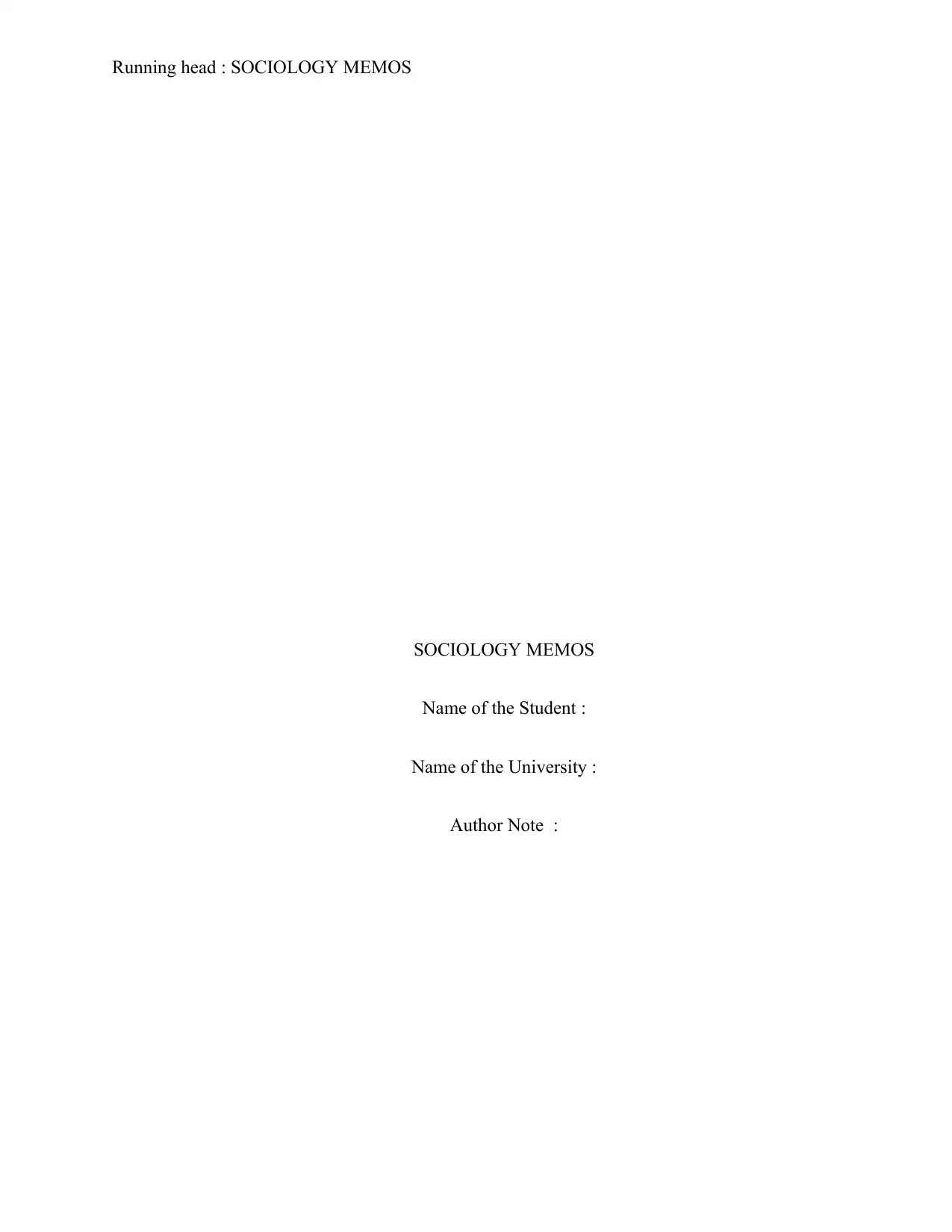
Running head : SOCIOLOGY MEMOS
SOCIOLOGY MEMOS
Name of the Student :
Name of the University :
Author Note :
SOCIOLOGY MEMOS
Name of the Student :
Name of the University :
Author Note :
Paraphrase This Document
Need a fresh take? Get an instant paraphrase of this document with our AI Paraphraser
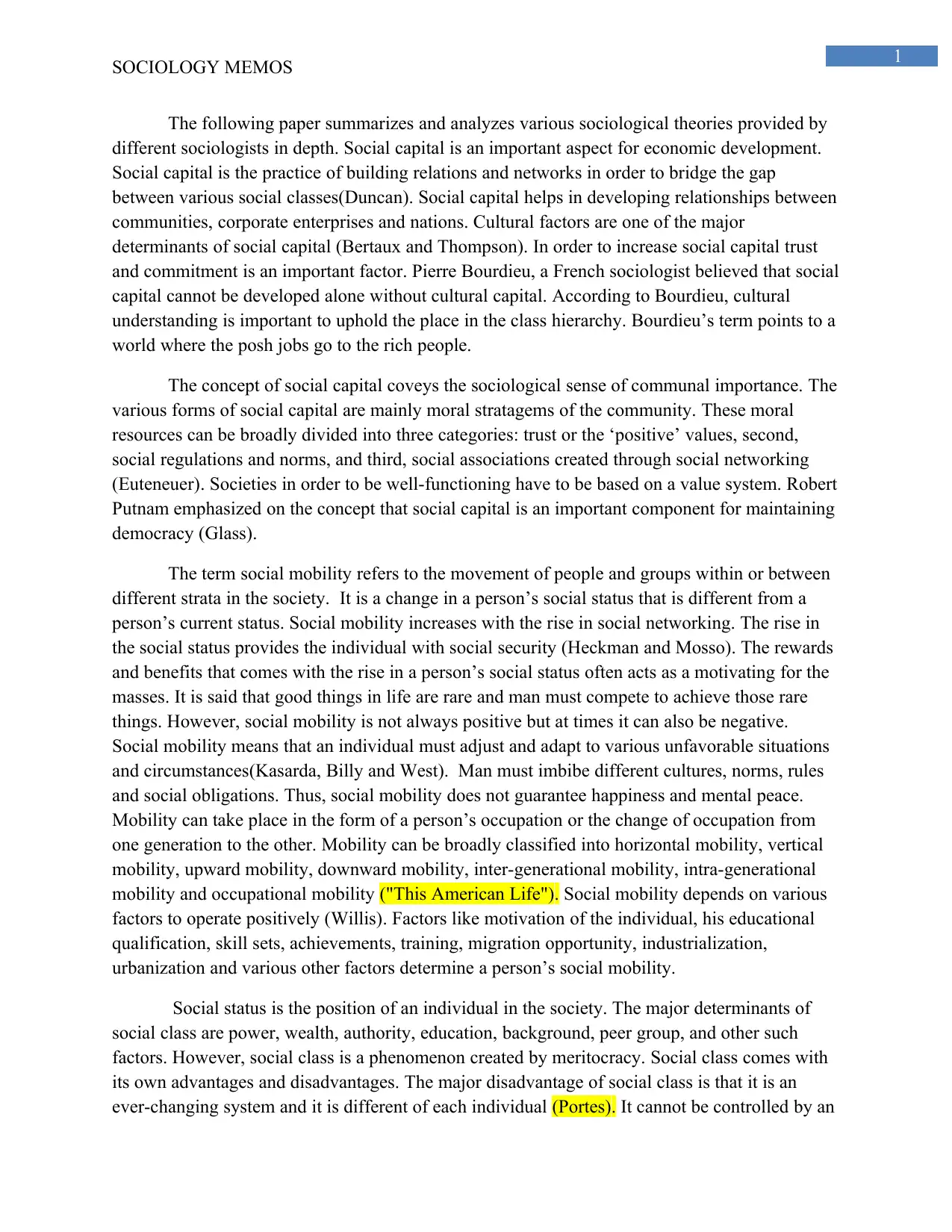
1
SOCIOLOGY MEMOS
The following paper summarizes and analyzes various sociological theories provided by
different sociologists in depth. Social capital is an important aspect for economic development.
Social capital is the practice of building relations and networks in order to bridge the gap
between various social classes(Duncan). Social capital helps in developing relationships between
communities, corporate enterprises and nations. Cultural factors are one of the major
determinants of social capital (Bertaux and Thompson). In order to increase social capital trust
and commitment is an important factor. Pierre Bourdieu, a French sociologist believed that social
capital cannot be developed alone without cultural capital. According to Bourdieu, cultural
understanding is important to uphold the place in the class hierarchy. Bourdieu’s term points to a
world where the posh jobs go to the rich people.
The concept of social capital coveys the sociological sense of communal importance. The
various forms of social capital are mainly moral stratagems of the community. These moral
resources can be broadly divided into three categories: trust or the ‘positive’ values, second,
social regulations and norms, and third, social associations created through social networking
(Euteneuer). Societies in order to be well-functioning have to be based on a value system. Robert
Putnam emphasized on the concept that social capital is an important component for maintaining
democracy (Glass).
The term social mobility refers to the movement of people and groups within or between
different strata in the society. It is a change in a person’s social status that is different from a
person’s current status. Social mobility increases with the rise in social networking. The rise in
the social status provides the individual with social security (Heckman and Mosso). The rewards
and benefits that comes with the rise in a person’s social status often acts as a motivating for the
masses. It is said that good things in life are rare and man must compete to achieve those rare
things. However, social mobility is not always positive but at times it can also be negative.
Social mobility means that an individual must adjust and adapt to various unfavorable situations
and circumstances(Kasarda, Billy and West). Man must imbibe different cultures, norms, rules
and social obligations. Thus, social mobility does not guarantee happiness and mental peace.
Mobility can take place in the form of a person’s occupation or the change of occupation from
one generation to the other. Mobility can be broadly classified into horizontal mobility, vertical
mobility, upward mobility, downward mobility, inter-generational mobility, intra-generational
mobility and occupational mobility ("This American Life"). Social mobility depends on various
factors to operate positively (Willis). Factors like motivation of the individual, his educational
qualification, skill sets, achievements, training, migration opportunity, industrialization,
urbanization and various other factors determine a person’s social mobility.
Social status is the position of an individual in the society. The major determinants of
social class are power, wealth, authority, education, background, peer group, and other such
factors. However, social class is a phenomenon created by meritocracy. Social class comes with
its own advantages and disadvantages. The major disadvantage of social class is that it is an
ever-changing system and it is different of each individual (Portes). It cannot be controlled by an
SOCIOLOGY MEMOS
The following paper summarizes and analyzes various sociological theories provided by
different sociologists in depth. Social capital is an important aspect for economic development.
Social capital is the practice of building relations and networks in order to bridge the gap
between various social classes(Duncan). Social capital helps in developing relationships between
communities, corporate enterprises and nations. Cultural factors are one of the major
determinants of social capital (Bertaux and Thompson). In order to increase social capital trust
and commitment is an important factor. Pierre Bourdieu, a French sociologist believed that social
capital cannot be developed alone without cultural capital. According to Bourdieu, cultural
understanding is important to uphold the place in the class hierarchy. Bourdieu’s term points to a
world where the posh jobs go to the rich people.
The concept of social capital coveys the sociological sense of communal importance. The
various forms of social capital are mainly moral stratagems of the community. These moral
resources can be broadly divided into three categories: trust or the ‘positive’ values, second,
social regulations and norms, and third, social associations created through social networking
(Euteneuer). Societies in order to be well-functioning have to be based on a value system. Robert
Putnam emphasized on the concept that social capital is an important component for maintaining
democracy (Glass).
The term social mobility refers to the movement of people and groups within or between
different strata in the society. It is a change in a person’s social status that is different from a
person’s current status. Social mobility increases with the rise in social networking. The rise in
the social status provides the individual with social security (Heckman and Mosso). The rewards
and benefits that comes with the rise in a person’s social status often acts as a motivating for the
masses. It is said that good things in life are rare and man must compete to achieve those rare
things. However, social mobility is not always positive but at times it can also be negative.
Social mobility means that an individual must adjust and adapt to various unfavorable situations
and circumstances(Kasarda, Billy and West). Man must imbibe different cultures, norms, rules
and social obligations. Thus, social mobility does not guarantee happiness and mental peace.
Mobility can take place in the form of a person’s occupation or the change of occupation from
one generation to the other. Mobility can be broadly classified into horizontal mobility, vertical
mobility, upward mobility, downward mobility, inter-generational mobility, intra-generational
mobility and occupational mobility ("This American Life"). Social mobility depends on various
factors to operate positively (Willis). Factors like motivation of the individual, his educational
qualification, skill sets, achievements, training, migration opportunity, industrialization,
urbanization and various other factors determine a person’s social mobility.
Social status is the position of an individual in the society. The major determinants of
social class are power, wealth, authority, education, background, peer group, and other such
factors. However, social class is a phenomenon created by meritocracy. Social class comes with
its own advantages and disadvantages. The major disadvantage of social class is that it is an
ever-changing system and it is different of each individual (Portes). It cannot be controlled by an
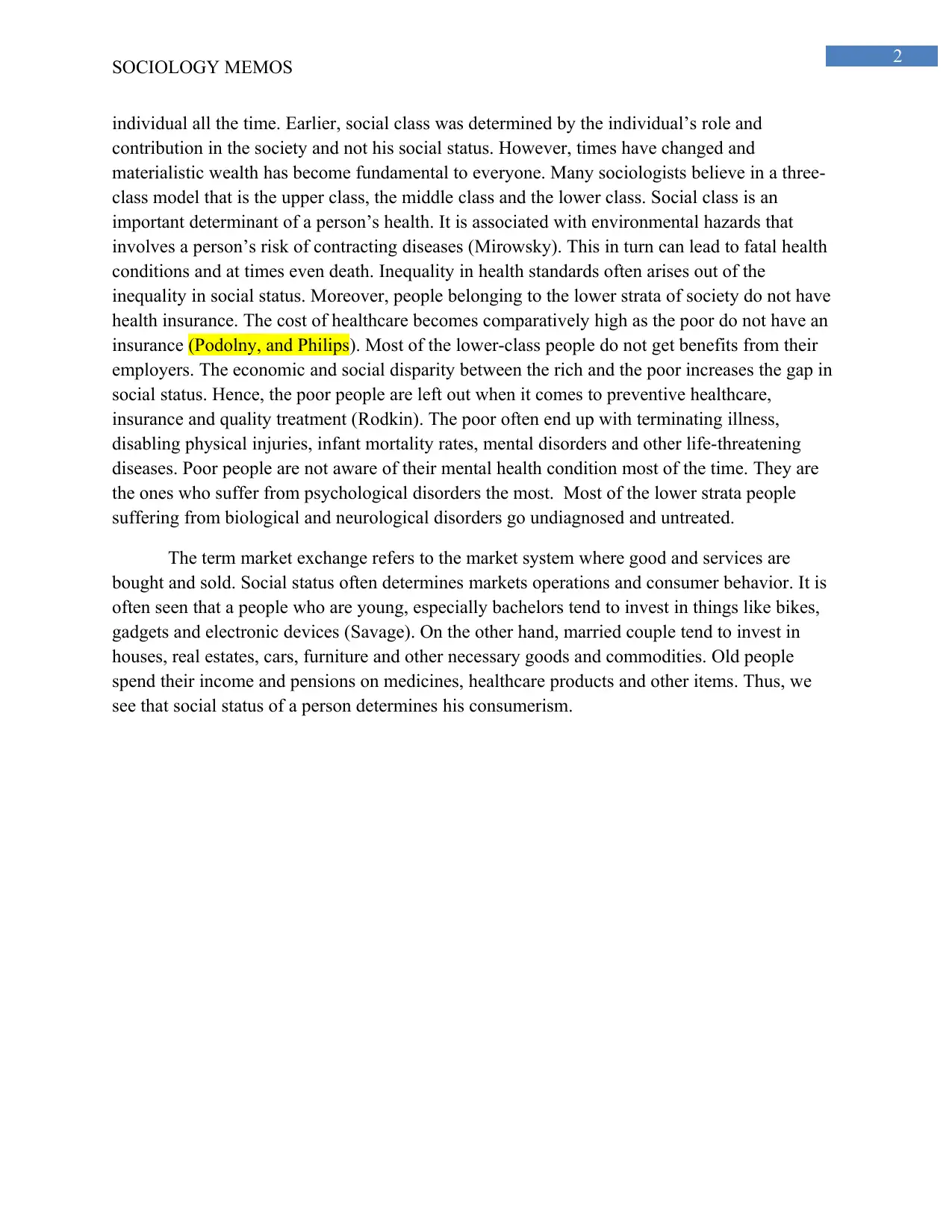
2
SOCIOLOGY MEMOS
individual all the time. Earlier, social class was determined by the individual’s role and
contribution in the society and not his social status. However, times have changed and
materialistic wealth has become fundamental to everyone. Many sociologists believe in a three-
class model that is the upper class, the middle class and the lower class. Social class is an
important determinant of a person’s health. It is associated with environmental hazards that
involves a person’s risk of contracting diseases (Mirowsky). This in turn can lead to fatal health
conditions and at times even death. Inequality in health standards often arises out of the
inequality in social status. Moreover, people belonging to the lower strata of society do not have
health insurance. The cost of healthcare becomes comparatively high as the poor do not have an
insurance (Podolny, and Philips). Most of the lower-class people do not get benefits from their
employers. The economic and social disparity between the rich and the poor increases the gap in
social status. Hence, the poor people are left out when it comes to preventive healthcare,
insurance and quality treatment (Rodkin). The poor often end up with terminating illness,
disabling physical injuries, infant mortality rates, mental disorders and other life-threatening
diseases. Poor people are not aware of their mental health condition most of the time. They are
the ones who suffer from psychological disorders the most. Most of the lower strata people
suffering from biological and neurological disorders go undiagnosed and untreated.
The term market exchange refers to the market system where good and services are
bought and sold. Social status often determines markets operations and consumer behavior. It is
often seen that a people who are young, especially bachelors tend to invest in things like bikes,
gadgets and electronic devices (Savage). On the other hand, married couple tend to invest in
houses, real estates, cars, furniture and other necessary goods and commodities. Old people
spend their income and pensions on medicines, healthcare products and other items. Thus, we
see that social status of a person determines his consumerism.
SOCIOLOGY MEMOS
individual all the time. Earlier, social class was determined by the individual’s role and
contribution in the society and not his social status. However, times have changed and
materialistic wealth has become fundamental to everyone. Many sociologists believe in a three-
class model that is the upper class, the middle class and the lower class. Social class is an
important determinant of a person’s health. It is associated with environmental hazards that
involves a person’s risk of contracting diseases (Mirowsky). This in turn can lead to fatal health
conditions and at times even death. Inequality in health standards often arises out of the
inequality in social status. Moreover, people belonging to the lower strata of society do not have
health insurance. The cost of healthcare becomes comparatively high as the poor do not have an
insurance (Podolny, and Philips). Most of the lower-class people do not get benefits from their
employers. The economic and social disparity between the rich and the poor increases the gap in
social status. Hence, the poor people are left out when it comes to preventive healthcare,
insurance and quality treatment (Rodkin). The poor often end up with terminating illness,
disabling physical injuries, infant mortality rates, mental disorders and other life-threatening
diseases. Poor people are not aware of their mental health condition most of the time. They are
the ones who suffer from psychological disorders the most. Most of the lower strata people
suffering from biological and neurological disorders go undiagnosed and untreated.
The term market exchange refers to the market system where good and services are
bought and sold. Social status often determines markets operations and consumer behavior. It is
often seen that a people who are young, especially bachelors tend to invest in things like bikes,
gadgets and electronic devices (Savage). On the other hand, married couple tend to invest in
houses, real estates, cars, furniture and other necessary goods and commodities. Old people
spend their income and pensions on medicines, healthcare products and other items. Thus, we
see that social status of a person determines his consumerism.
⊘ This is a preview!⊘
Do you want full access?
Subscribe today to unlock all pages.

Trusted by 1+ million students worldwide
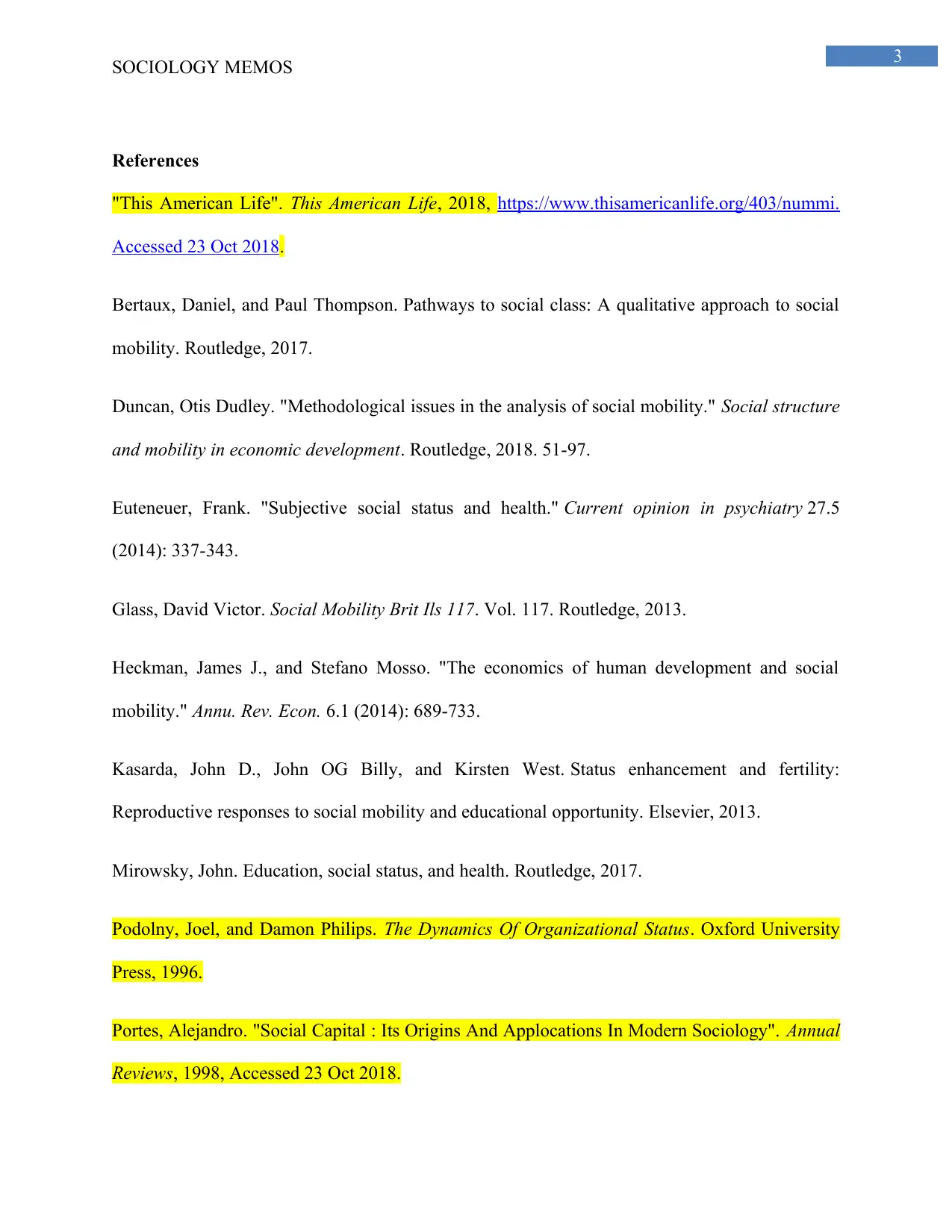
3
SOCIOLOGY MEMOS
References
"This American Life". This American Life, 2018, https://www.thisamericanlife.org/403/nummi.
Accessed 23 Oct 2018.
Bertaux, Daniel, and Paul Thompson. Pathways to social class: A qualitative approach to social
mobility. Routledge, 2017.
Duncan, Otis Dudley. "Methodological issues in the analysis of social mobility." Social structure
and mobility in economic development. Routledge, 2018. 51-97.
Euteneuer, Frank. "Subjective social status and health." Current opinion in psychiatry 27.5
(2014): 337-343.
Glass, David Victor. Social Mobility Brit Ils 117. Vol. 117. Routledge, 2013.
Heckman, James J., and Stefano Mosso. "The economics of human development and social
mobility." Annu. Rev. Econ. 6.1 (2014): 689-733.
Kasarda, John D., John OG Billy, and Kirsten West. Status enhancement and fertility:
Reproductive responses to social mobility and educational opportunity. Elsevier, 2013.
Mirowsky, John. Education, social status, and health. Routledge, 2017.
Podolny, Joel, and Damon Philips. The Dynamics Of Organizational Status. Oxford University
Press, 1996.
Portes, Alejandro. "Social Capital : Its Origins And Applocations In Modern Sociology". Annual
Reviews, 1998, Accessed 23 Oct 2018.
SOCIOLOGY MEMOS
References
"This American Life". This American Life, 2018, https://www.thisamericanlife.org/403/nummi.
Accessed 23 Oct 2018.
Bertaux, Daniel, and Paul Thompson. Pathways to social class: A qualitative approach to social
mobility. Routledge, 2017.
Duncan, Otis Dudley. "Methodological issues in the analysis of social mobility." Social structure
and mobility in economic development. Routledge, 2018. 51-97.
Euteneuer, Frank. "Subjective social status and health." Current opinion in psychiatry 27.5
(2014): 337-343.
Glass, David Victor. Social Mobility Brit Ils 117. Vol. 117. Routledge, 2013.
Heckman, James J., and Stefano Mosso. "The economics of human development and social
mobility." Annu. Rev. Econ. 6.1 (2014): 689-733.
Kasarda, John D., John OG Billy, and Kirsten West. Status enhancement and fertility:
Reproductive responses to social mobility and educational opportunity. Elsevier, 2013.
Mirowsky, John. Education, social status, and health. Routledge, 2017.
Podolny, Joel, and Damon Philips. The Dynamics Of Organizational Status. Oxford University
Press, 1996.
Portes, Alejandro. "Social Capital : Its Origins And Applocations In Modern Sociology". Annual
Reviews, 1998, Accessed 23 Oct 2018.
Paraphrase This Document
Need a fresh take? Get an instant paraphrase of this document with our AI Paraphraser
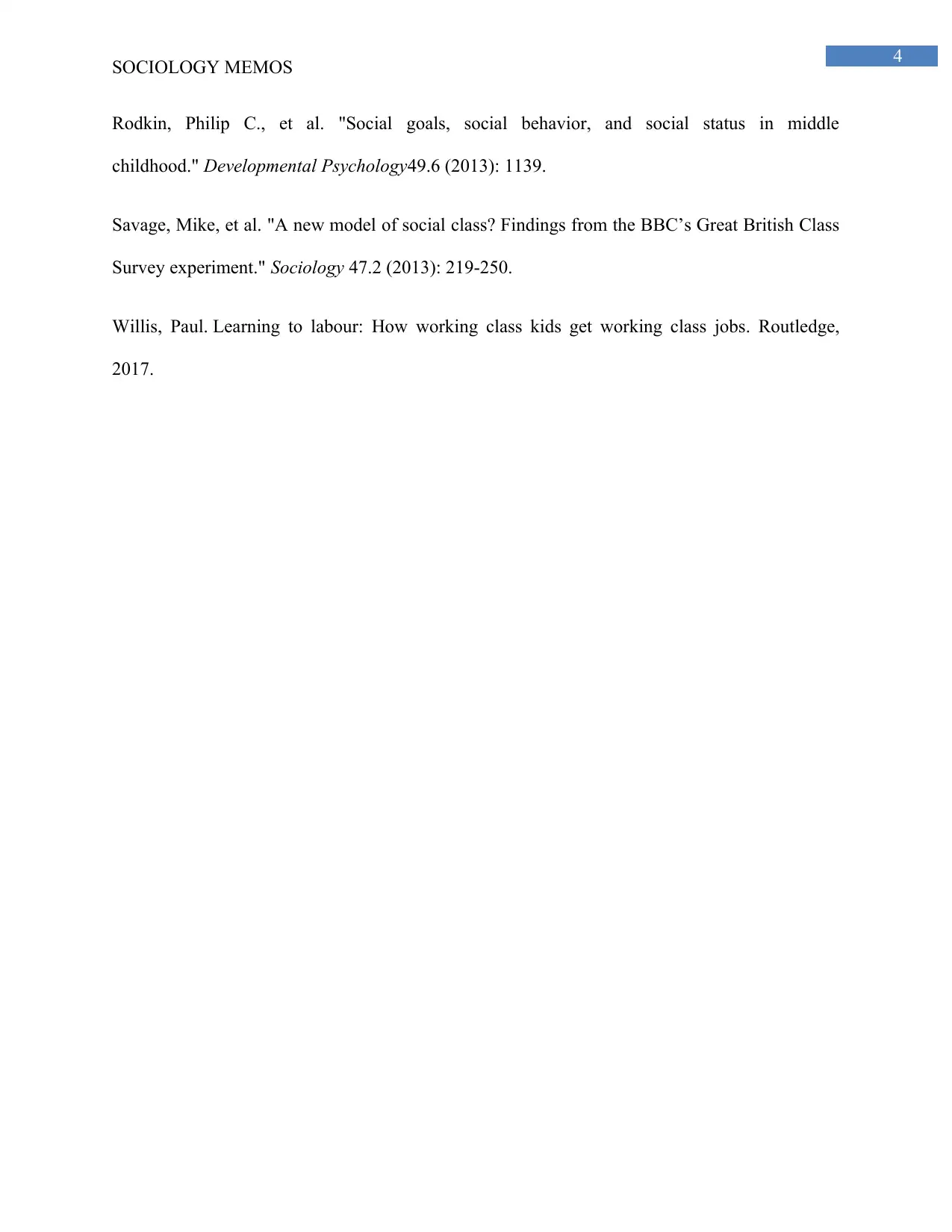
4
SOCIOLOGY MEMOS
Rodkin, Philip C., et al. "Social goals, social behavior, and social status in middle
childhood." Developmental Psychology49.6 (2013): 1139.
Savage, Mike, et al. "A new model of social class? Findings from the BBC’s Great British Class
Survey experiment." Sociology 47.2 (2013): 219-250.
Willis, Paul. Learning to labour: How working class kids get working class jobs. Routledge,
2017.
SOCIOLOGY MEMOS
Rodkin, Philip C., et al. "Social goals, social behavior, and social status in middle
childhood." Developmental Psychology49.6 (2013): 1139.
Savage, Mike, et al. "A new model of social class? Findings from the BBC’s Great British Class
Survey experiment." Sociology 47.2 (2013): 219-250.
Willis, Paul. Learning to labour: How working class kids get working class jobs. Routledge,
2017.
1 out of 5
Related Documents
Your All-in-One AI-Powered Toolkit for Academic Success.
+13062052269
info@desklib.com
Available 24*7 on WhatsApp / Email
![[object Object]](/_next/static/media/star-bottom.7253800d.svg)
Unlock your academic potential
Copyright © 2020–2025 A2Z Services. All Rights Reserved. Developed and managed by ZUCOL.





